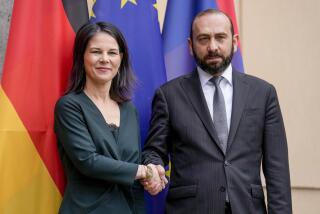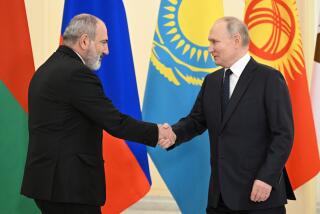Holdout Imperils Talks on Caucasus
- Share via
YEREVAN, Armenia — Growing division between the Armenian government and leaders of Nagorno-Karabakh has dashed hope that a preliminary settlement to the bitter strife over the tiny enclave could be reached by the end of the year.
The conflict over the mainly Armenian-populated enclave in Azerbaijan, a sometimes bloody battle that has been at a standstill since a 1994 cease-fire, will be an issue in Copenhagen starting Thursday when foreign ministers of the Organization for Security and Cooperation in Europe meet.
But after Nagorno-Karabakh’s recent rejection of a step-by-step approach to peace negotiations, which both Armenia and Azerbaijan support, it is unclear what will be the starting point for talks now.
“Two sides were very close to making a settlement,” said a diplomat here. But the third, Nagorno-Karabakh, “was a million miles away. There won’t be an agreement in Copenhagen because one of the parties will never agree and all of them have to be in agreement in order for any settlement to work.”
The sticking point for tiny Nagorno-Karabakh is the republic’s status, which, if a phased approach was adopted, would be decided last. Arkady Gukasyan, the republic’s president, has insisted that he would never agree to any accord in which Nagorno-Karabakh would be subordinated to Azerbaijan. And he opposes the return of any territory until that status is resolved because, he and his supporters say, there are no security guarantees.
The phased approach, which Gukasyan now has rejected, envisioned a return of six of seven occupied territories outside the boundaries of Nagorno-Karabakh to Azerbaijan, a gradual return of some of the almost 1 million Azerbaijani refugees to the region and deployment of an international peacekeeping force.
Meanwhile, time could be running out for Armenia to reach a favorable settlement. Armenian President Levon A. Ter-Petrosyan has stated that economic concerns necessitate a speedy resolution to the conflict to ensure his country is not isolated in the region.
“The unresolved state of the Karabakh question is not in the interests of Nagorno-Karabakh or Armenia because it is palpably hindering the economic development of Armenia,” he wrote in a recent article. “The only option now is a compromise. We can’t wait because Armenia and Nagorno-Karabakh are strong today, but in a year or two we’ll be substantially weakened.”
Although Armenia’s energy crisis has been solved--it has electricity for a second winter now--a slowdown in economic development is starting to sharpen the contrast between Yerevan and the cities of adjacent former Soviet republics.
Although the markets and shops in the Armenian capital are full of goods, the city looks bleak. Unlike in neighboring Georgia and Azerbaijan--where new restaurants and shops open every day, the streets are buzzing, and foreign investment is visible--Yerevan’s quiet streets are reminiscent of an unchanged provincial Russian city.
International lenders have expressed disappointment with Armenia’s higher than expected inflation rate of 17.4% for the first 10 months of 1997 and relatively small economic growth of 3.3%--lower than that of neighboring countries and lower than Yerevan’s economic growth last year.
A Turkish blockade, which will not be lifted until there is a solution to the Karabakh conflict, forces landlocked Armenia to trade with Iran and Russia, although the Turks are the Armenians’ logical trading partners.
But Ter-Petrosyan’s pragmatic position has been rejected by opponents, who demonstrated in the capital last week, insisting on no compromises on Karabakh.
The president even faces resistance in his own government from Prime Minister Robert Kocharian--the former Nagorno-Karabakh president--who opposes a step-by-step agreement.
Because of the impasse, Armenia also is losing out on benefits of the oil bonanza in Azerbaijan, which has, in turn, increased Georgia’s potential as a corridor for moving equipment and goods.
And Azerbaijani officials recently announced that Armenia will not be considered as a possible route for the main pipeline.
Analysts say that by century’s end, Azerbaijan, where there are already pledges of $30 billion in oil investment, will have a much stronger position in any negotiations. This will occur in part because in Washington, U.S. oil interests could carry more clout than the strong lobbying now done by Americans of Armenian descent.
More to Read
Sign up for Essential California
The most important California stories and recommendations in your inbox every morning.
You may occasionally receive promotional content from the Los Angeles Times.










